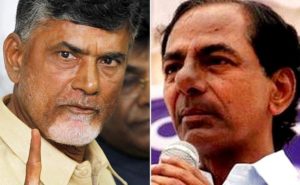 Hyderabad: The battle for power in Andhra Pradesh is being fought not just in that state but beyond its borders in neighboring Telangana.
Hyderabad: The battle for power in Andhra Pradesh is being fought not just in that state but beyond its borders in neighboring Telangana.
Ahead of simultaneous Assembly and Lok Sabha elections in Andhra Pradesh, the two Telugu states are locked in what is being described by many as a “data war’.
With the Telangana Police booking a case of data theft against an IT company providing services to Andhra Pradesh’s ruling Telugu Desam Party (TDP), a war of words has broken out between the two state governments.
While police claimed that the Hyderabad-based company misused personal data of Andhra Pradesh citizens to help the TDP identify ‘anti-TDP’ voters for deletion, the TDP termed it as a conspiracy by the Telangana Rashtra Samithi (TRS) government to help the opposition YSR Congress party.
After the TRS’ landslide victory in the Telangana Assembly election in December, Chief Minister K. Chandrashekhar Rao had vowed to ‘return the gift’ to his Andhra Pradesh counterpart, N. Chandrababu Naidu.
KCR, as Rao is popularly known, was furious over the TDP chief’s campaign in Telangana along with his new ally, the Congress.
As the TDP could win just two seats in Telangana and one of the two MLAs recently defected to the TRS, KCR has almost achieved his goal of politically eliminating TDP in Telangana. He, however, wants to settle the scores with Naidu by taking the fight to his home turf.
KCR and his son and TRS Working President K.T. Rama Rao had declared that they will visit Andhra Pradesh to campaign against TDP and support main opposition YSR Congress.
Just as KCR made Naidu’s participation in Telangana poll campaign an issue to play the Telangana sentiment card, there was a possibility of Naidu using KCR’s campaign to his advantage by making it an issue of Andhra self-respect.
Hinting that they have dropped the plan to campaign in Andhra, Rama Rao last week remarked that Naidu would lose even without their campaigning. He predicted that YSR Congress leader Y.S. Jaganmohan Reddy will become the Chief Minister of Andhra Pradesh.
This is not the first time that the two state governments are on a collision course. The relations between them were strained ever since formation of Telangana state with the bifurcation of Andhra Pradesh in 2014.
The first major showdown was seen in June 2015 when then TDP legislator of Telangana A. Revanth Reddy was caught red-handed offering Rs 50 lakh in cash to nominated legislator Elvis Stephenson belonging to TRS to make him vote for a TDP candidate in the legislative council election. An audio-tape of Naidu’s purported telephonic conversation with Stephenson also surfaced.
The cash-for-vote scam added to the acrimony between the two governments functioning in Hyderabad. KCR launched a scathing attack on Naidu and accused him of plotting to topple his government.
A few weeks later Naidu shifted base to Vijayawada along with the state secretariat, the seat of governance. Though Hyderabad was declared common capital for 10 years, Naidu decided to shift early to oversee construction of the new state capital, Amaravati.
KCR later attended the foundation stone laying ceremony of Amaravati and the two Chief Ministers shared the dais on a couple of occasions to express their readiness to work together to resolve outstanding issues.
The fresh round of battle began during Telangana elections when Naidu joined hands with the Congress after burying his 35-year-old rivalry with the party. Campaigning aggressively in and around Hyderabad, Naidu recalled the role he played in the city’s development as IT hub as Chief Minister of undivided Andhra Pradesh and tried to woo the voters belonging to Andhra Pradesh but settled in Hyderabad.
The case booked against IT Grids Pvt Ltd for illegal access to confidential data relating to 3.5 crore voters of Andhra Pradesh has sparked the latest row with Naidu questioning Telangana’s locus standi to book a case in a matter relating to data of other state and Telangana defending the action with the argument that cases are booked where an offence has occurred.

























